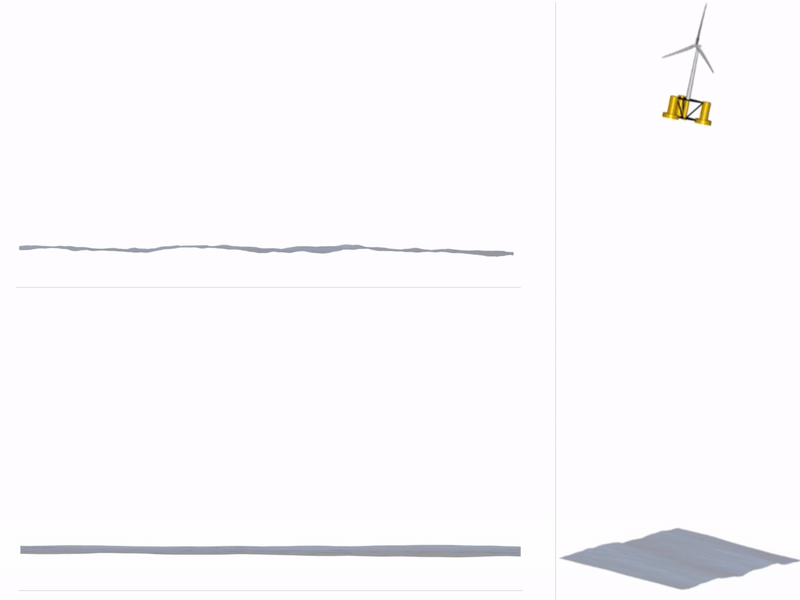Forum
Important Notice for New User Registrations
To combat an increasing number of spam and bot registrations, we now manually approve all new user registrations. While this may cause a delay until your account is approved, this step is essential to ensure the quality and security of this forum.
To help us verify your registration as legitimate, please use a clear name as user name or an official email address (such as a work, university, or similar address). If you’re concerned that we may not recognize your registration as non-spam, feel free to email us at with a request to approve your username.
Increase of turbine simulation speed
Quote from cuong41 on 16. April 2025, 15:24Hello,
I want to increase the simulation speed of my model, sadly the simulation is crashing once the timestep size is around 0,1 (simulation length ~27 s) or higher. Either one of those errors occur:
The structural model diverged! Simulation aborted …
Structural relaxation for (modelfilename) failed!
Have I reached the limit of how fast the simulation can go ? Or is there another way to speed it up?
Furthermore I cant figure out how to adjust the visible ocean surface area of my floating model, is it tied to the global coordinate systems size or can you just increase the ocean surface grid? . If i go to “Environment Visualization Options” and want to change the width/length it keeps jumping back to 283.5 m.
Thank you a lot in advance , I appreciate it. 🙂
Hello,
I want to increase the simulation speed of my model, sadly the simulation is crashing once the timestep size is around 0,1 (simulation length ~27 s) or higher. Either one of those errors occur:
The structural model diverged! Simulation aborted …
Structural relaxation for (modelfilename) failed!
Have I reached the limit of how fast the simulation can go ? Or is there another way to speed it up?
Furthermore I cant figure out how to adjust the visible ocean surface area of my floating model, is it tied to the global coordinate systems size or can you just increase the ocean surface grid? . If i go to “Environment Visualization Options” and want to change the width/length it keeps jumping back to 283.5 m.
Thank you a lot in advance , I appreciate it. 🙂
Quote from David on 17. April 2025, 14:39Hi,
when simulating a wind turbine with a structural model, the timestep size must be chosen carefully to ensure numerical stability and accuracy. Specifically, the timestep needs to be small enough to sufficiently resolve the dominant structural eigenfrequencies of the system.
In addition, since QBlade uses a loosely coupled approach between the aerodynamic and structural solvers, the timestep must also be fine enough to accurately capture the aeroelastic interaction between the two domains.
If the timestep is too large, the simulation may become unstable and ultimately fail, typically due to divergence in the structural model resulting from one or both of the above factors.
BR,
David
Hi,
when simulating a wind turbine with a structural model, the timestep size must be chosen carefully to ensure numerical stability and accuracy. Specifically, the timestep needs to be small enough to sufficiently resolve the dominant structural eigenfrequencies of the system.
In addition, since QBlade uses a loosely coupled approach between the aerodynamic and structural solvers, the timestep must also be fine enough to accurately capture the aeroelastic interaction between the two domains.
If the timestep is too large, the simulation may become unstable and ultimately fail, typically due to divergence in the structural model resulting from one or both of the above factors.
BR,
David
Quote from cuong41 on 17. April 2025, 21:20Hey,
thanks for the reply, so it seems like it is the limit…
and what about the question about the ocean surface area?
thanks in advance
BR,
Cuong
Hey,
thanks for the reply, so it seems like it is the limit…
and what about the question about the ocean surface area?
thanks in advance
BR,
Cuong
Quote from David on 18. April 2025, 11:08Hello Cuong,
to manually scale the visualized scene, please make sure to disable the “Auto Scale Environment” option. This button is located just above the input fields where you can adjust the length and width of the rendered scene.
If “Auto Scale Environment” is enabled, the scene will automatically scale to fit the currently displayed turbine, which will override any manual adjustments you make.
BR,
David
Hello Cuong,
to manually scale the visualized scene, please make sure to disable the “Auto Scale Environment” option. This button is located just above the input fields where you can adjust the length and width of the rendered scene.
If “Auto Scale Environment” is enabled, the scene will automatically scale to fit the currently displayed turbine, which will override any manual adjustments you make.
BR,
David


